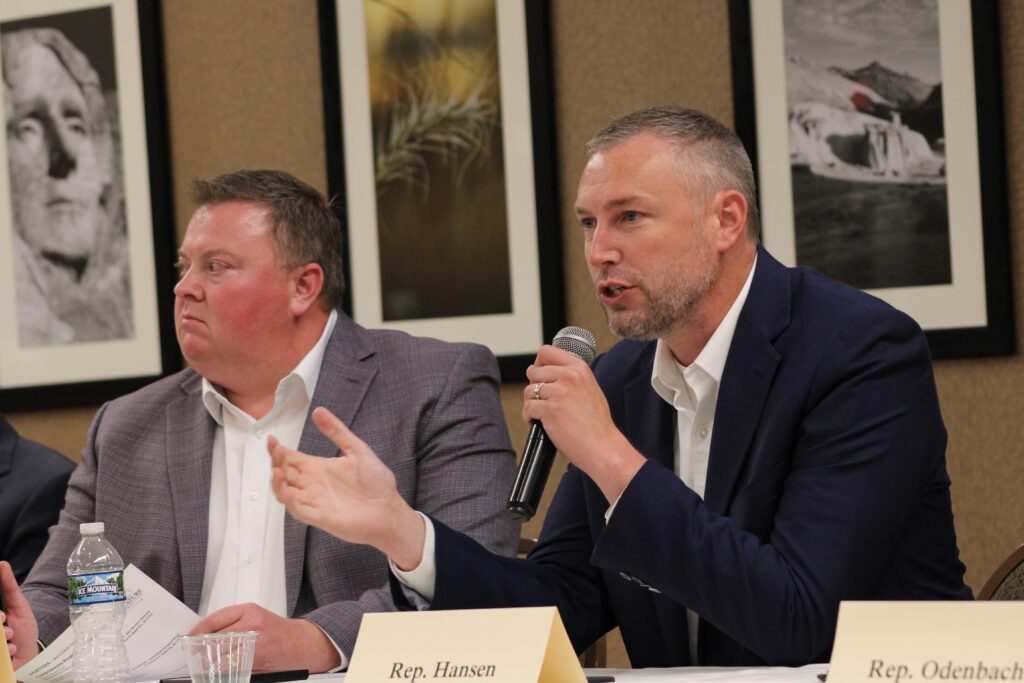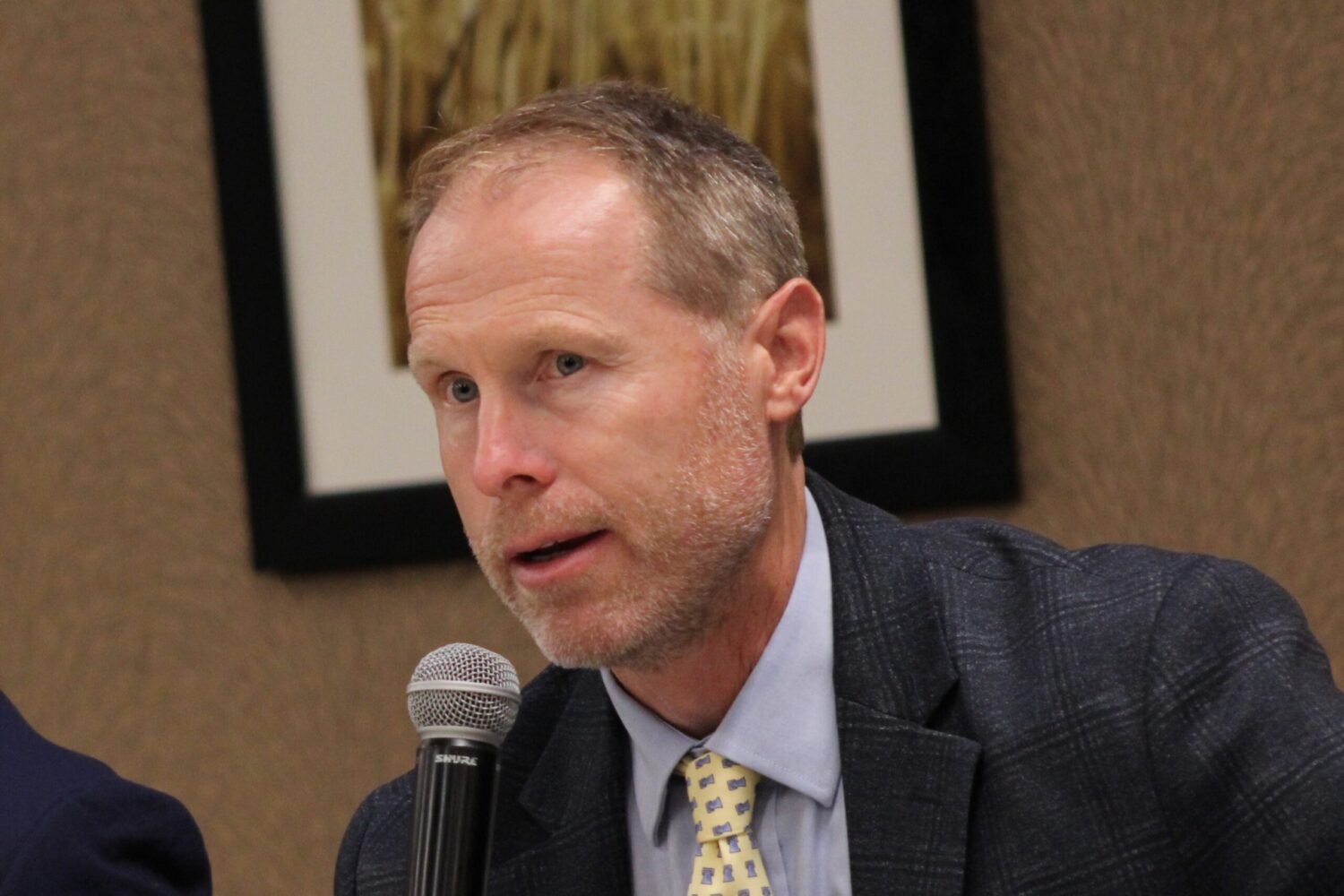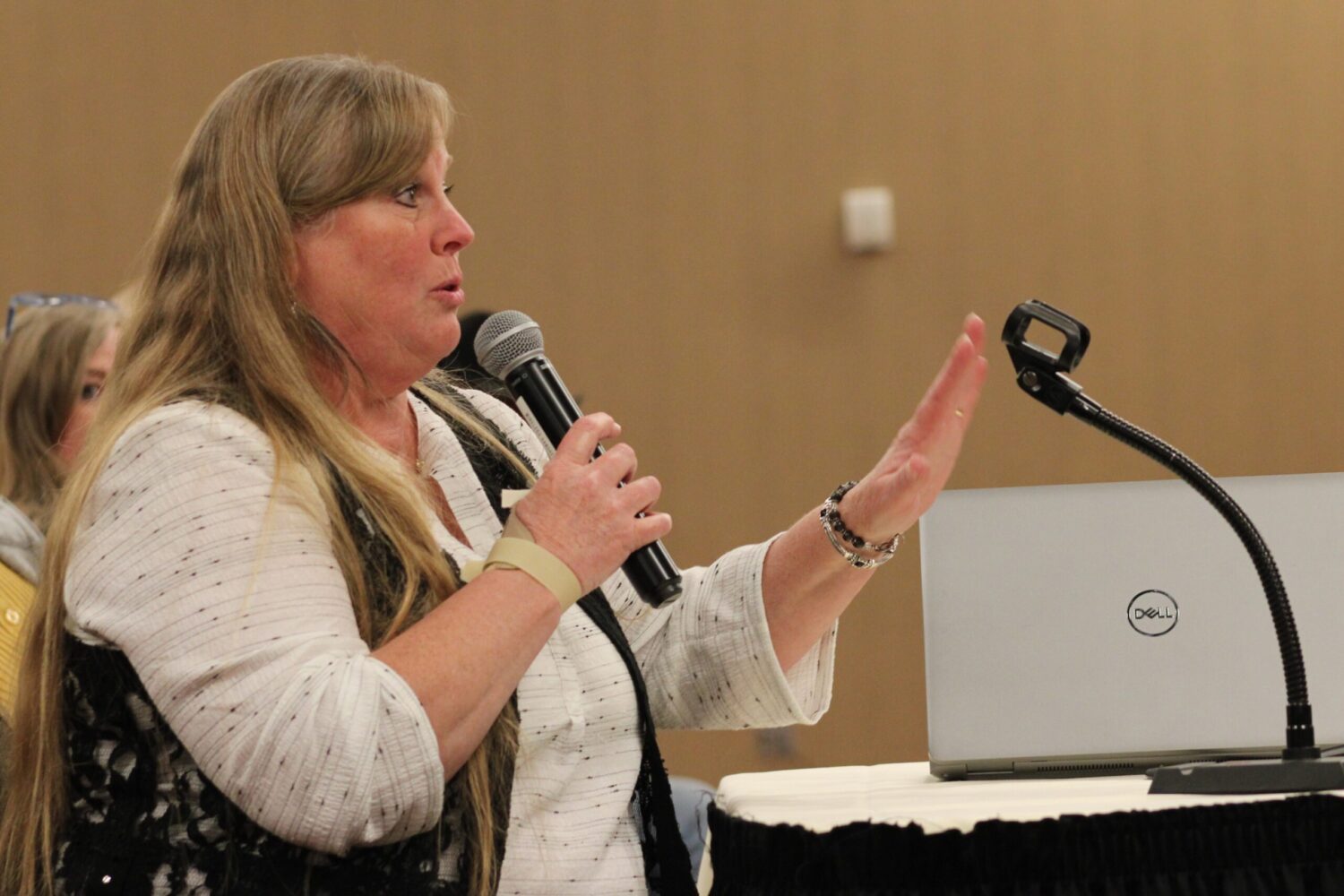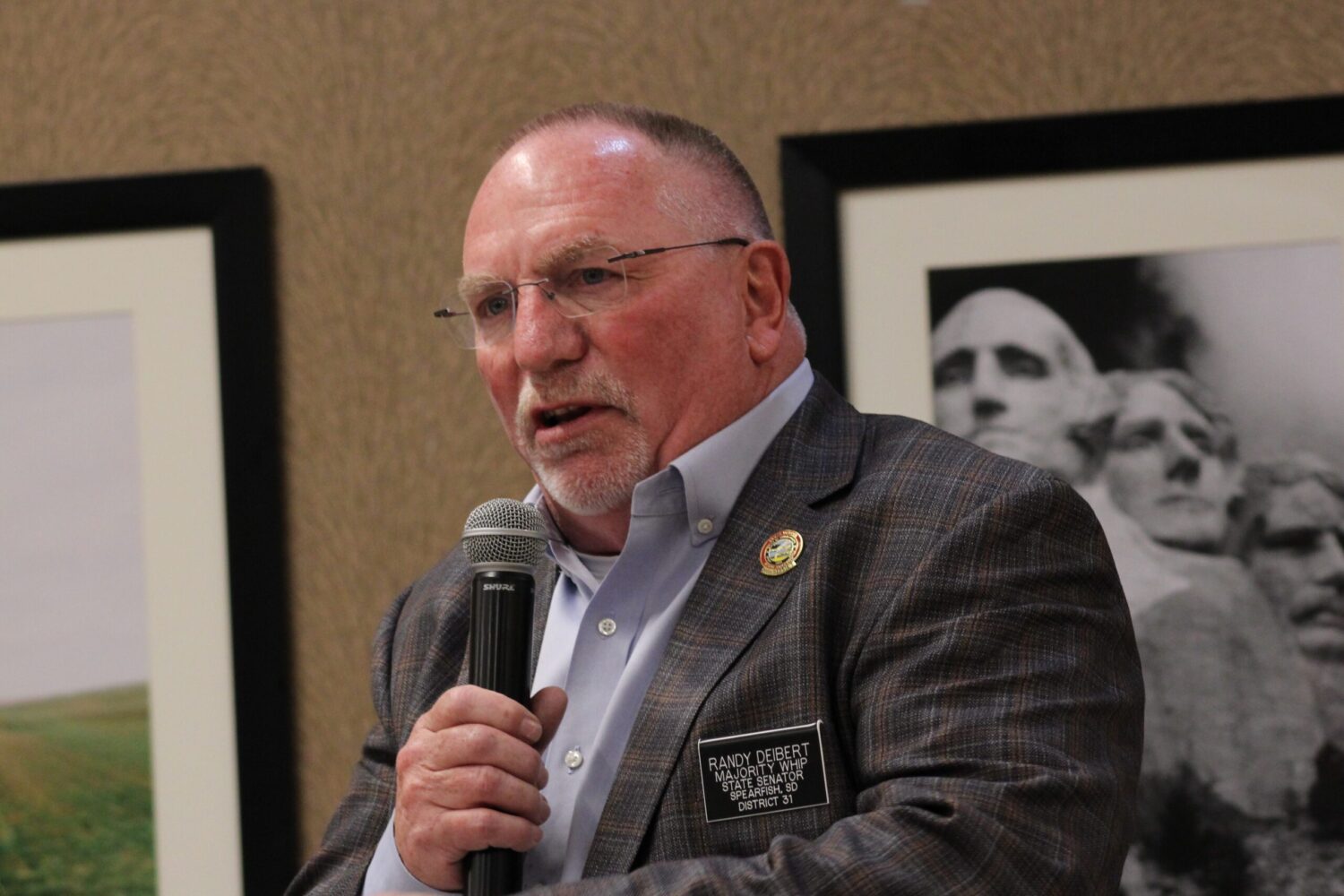
State House Speaker Jon Hansen, R-Dell Rapids, speaks during a Comprehensive Property Tax Task Force meeting on July 16, 2025, at the Ramkota in Rapid City. At left is state Senate President Pro Tempore Chris Karr, R-Sioux Falls. Karr chairs the group, and Hansen is the vice-chair. (Seth Tupper/South Dakota Searchlight)
Members of a task force aiming to reduce the property tax burden for South Dakota homeowners are considering proposals to reduce or replace property taxes by relying on sales or transaction taxes.
The task force dug into two proposals and heard a new idea from a former lawmaker at its latest meeting in Rapid City earlier this month. The Legislative Research Council also prepared other options to reduce or replace property taxes.
“It takes a lot of courage to try and digest all of this,” said task force member and state House Majority Leader Scott Odenbach, R-Spearfish. “For too long, because it’s such a beast, people have had trouble getting their hands around property taxes, what they fund, and increased spending, until people get forced out of their homes.”

The Comprehensive Property Tax Task Force aims to recommend ways to cut the average South Dakota homeowner’s property taxes by at least 50%. Lawmakers already adopted Republican Gov. Larry Rhoden’s proposal earlier this year to slow property tax increases with multifaceted reforms including a five-year, countywide 3% cap on growth in owner-occupied home assessments.
Property taxes go to schools, counties, cities and other local taxing entities, such as water and fire districts. Sales taxes go to cities and the state. The state does not receive any property tax revenue.
The total, statewide amount of property taxes paid on owner-occupied homes grew by 64% from 2017 to 2024, according to state Department of Revenue data. A public outcry about rising tax bills led legislators to appoint the summer task force, which aims to propose legislation for the annual winter lawmaking session.
The task force has heard public comment not only in Rapid City but also in Sioux Falls and plans to meet three more times, including in Aberdeen and Pierre.
“I think we’re at a point where we need to start coalescing ideas and presenting them,” said the chairman of the task force, state Senate President Pro Tempore Chris Karr, R-Sioux Falls.
Task force hears new proposal
The newest proposal pitched to the task force this month would add a flat $1.50 tax on transactions of $15 or greater, and add a tax of 10% on smaller transactions. The new tax, said former state Sen. Julie Frye-Mueller, R-Rapid City, would replace property taxes entirely by generating $1.75 billion in revenue.
“Our ultimate goal is to remove the threat of government or others from taking our properties with a tax lien,” Frye-Mueller said.
A tax lien is a legal claim that local governments can place on a home when property taxes are delinquent. It triggers a process that can ultimately lead to the seizure and sale of the property.

The transaction taxes would be added on top of the state’s current sales tax structure, which includes the state 4.2% sales tax, up to 2% city sales taxes, and up to 1% additional city taxes on alcohol, restaurants, event admissions and lodging.
With all of those rates applied, the current tax on a $15 purchase would be $1.08. With the additional flat transaction tax, it would grow to $2.58.
Frye-Mueller said the transaction taxes would also be applied to purchases that are currently exempt from sales taxes. She and other speakers said it would not be regressive since property taxes would no longer exist or be figured into monthly rental amounts.
The proposal uses a calculation relying on visitor spending from 15 million people, which made some lawmakers skeptical. The state Department of Revenue would collect the tax and distribute it among local governments, based on their budgeting needs, according to the presentation. The proposal would allow the Legislature to increase the flat rate by up to a nickel each year.
The group backing the proposal, Abolish Property Taxes South Dakota, plans to ask legislators to put the plan on the ballot for voters to consider. If that fails, they plan to submit it as a citizen-initiated ballot measure for the November 2026 election.
More details on governor’s proposal
Gov. Rhoden has proposed an optional county-level sales tax of a half-percent to offset participating counties’ property taxes on owner-occupied homes. A “homeowner tax credit” would be applied to property taxes from the revenue generated from the half-percent sales tax, according to proposal documents. A homeowner’s tax bill would show the amount of tax credits applied to the property.
If funds from the optional sales tax fully offset owner-occupied property taxes in a county, remaining funds would be used to lower property taxes for agricultural and commercial properties. The tax relief option could be referred to a public vote if residents don’t agree with their local county commission’s decision to impose it.
Some lawmakers worried that the sales tax idea would shift the tax burden from property to sales and South Dakotans wouldn’t see an overall reduction in taxes they pay. Bureau of Finance and Management Commissioner Jim Terwilliger and Sen. Randy Deibert, R-Spearfish, said homeowners would save money.
“I’d have to spend $50,000 before I matched my local county taxation with a 0.5% sales tax,” Deibert said. “That’s just in my district.”

Statewide, a half-percent sales tax would replace, on average, 94% of a county’s share of owner-occupied property taxes, according to estimates from the governor’s administration. The proposal would not affect the property taxes received by cities, schools and other local taxing entities.
In Minnehaha County, the half-percent sales tax would cover an estimated 98% of owner-occupied property taxes. The strategy would cover an estimated 76% in Pennington County.
Counties that share jurisdiction with tribal land would see the largest potential increase in funds to offset property taxes, largely because tribal land is not subject to property taxes. The counties that would see the lowest benefit, based on the estimates, would be Turner, Clay and Meade counties at 48%, 52% and 56% of owner-occupied taxes, respectively.
LRC studies other options
In a white paper prepared by the Legislative Research Council, eliminating the county portion of owner-occupied taxes would, on average, reduce homeowners’ property taxes by 20%.
South Dakota schools rely on three education levies collected through property taxes: general education, special education and capital outlay. Eliminating the special education and general education levies would reduce average owner-occupied property taxes by 25%.
Eliminating two education and the county levies would cost $430.8 million to counties and schools, unless the loss is replaced with different revenue sources.
The white sheet explored different ways to replace property taxes wholly or in part by increasing local governments’ other revenues or capturing more state funding for local use, including cutting state government across the board, raising sales tax rates, increasing the contractor’s excise tax rate, redirecting a portion of Future Fund economic development dollars toward property tax relief, increasing the state’s share of video lottery revenue, removing some sales tax and property tax exemptions, and placing a new tax on vaping. Each proposal would put some or all of the savings or gains toward local governments for property tax reductions.
As lawmakers debate tax policy changes, stay in the know: Sign up for our free newsletter.
The research also dug into a tax that state Senate Majority Leader Jim Mehlhaff proposed at a prior meeting. Mehlhaff, R-Pierre, proposed an additional 1% tax on all sales in the state including currently exempt sales, except for items intended for resale and items that, constitutionally, cannot be taxed.
Originally, the proposal was thought to be able to replace education property taxes paid across all types of property, which was $928.6 million in 2023. Owner-occupied property taxes paid for $382.4 million that year. Based on the latest LRC estimate, the tax would generate about $698 million in revenue for education.
Odenbach, who chairs the task force’s school funding work group, said the revenue replacement would have to be “iron clad” and not allow local governments to increase budgets through property taxes later. He added that some exemptions in the state tax code could be repealed and cuts could be made across state government, among other things, to raise money that could be applied to reduce property taxes for South Dakotans.
“I think these things are all in the mix,” Odenbach said.
South Dakota homeowners paid about $792 million in owner-occupied property taxes in 2024. South Dakotans across all types of property paid nearly $1.8 billion in property taxes.


